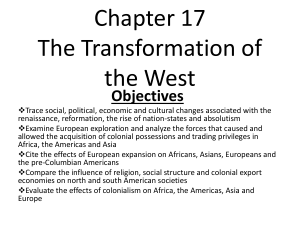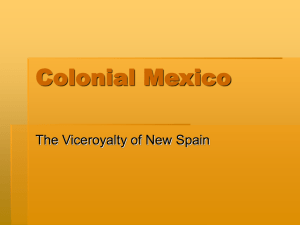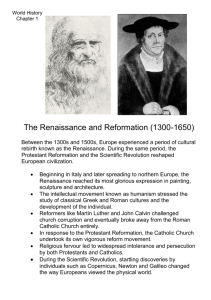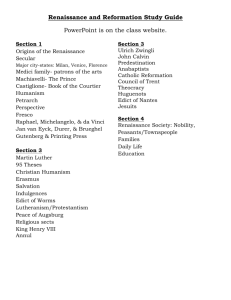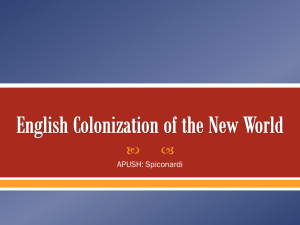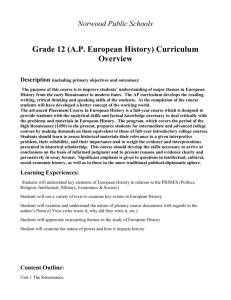Bell Ringer
advertisement
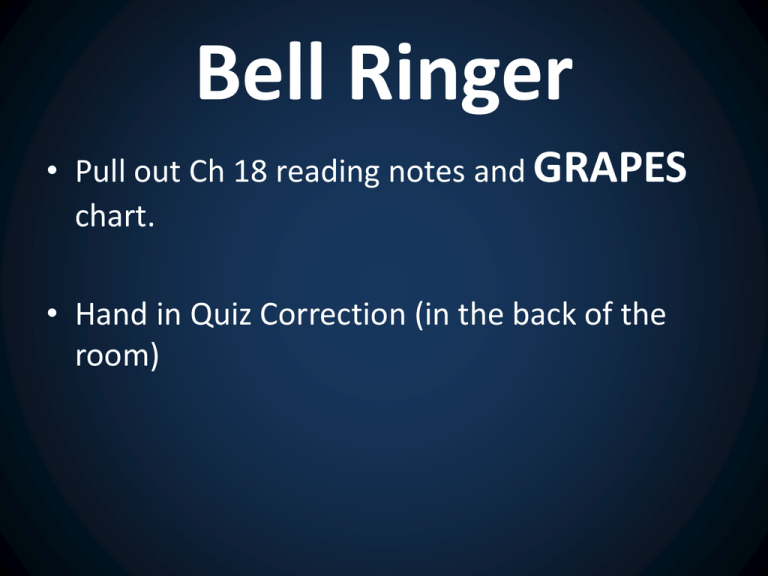
Bell Ringer • Pull out Ch 18 reading notes and GRAPES chart. • Hand in Quiz Correction (in the back of the room) Agenda • Bell ringer • Finish Frame activity (discussion) • Notes Homework • Taboo Cards: Enlightenment, Reformation, Absolute Monarchs • Timeline: Western Europe • Timeline: South America Objectives • 4.1 Describe the unifying themes of the Early Modern Period • 4.2 Summarize the impact of cultural changes in the West, including the renaissance and Reformation • 4.3 Explain the causes and impacts of the Age of Exploration and the expansion of early European colonial empires • 4.4 Describe the global trade process known as the Columbian Exchange 4.4 Summarize the impact of cultural changes in the West, including the renaissance and Reformation • http://www.youtube.com/user/historyteacher s#p/u/5/89Xv4mV1BIs The Renaissance! • What? • Why Italy? – Urban, commercial, competitive • Renaissance spirit: Humanism • • • • Renaissance People Michelangelo Leonardo da Vinci Shakespeare Erasmus Renaissance Effects • How does the Renaissance… – Make Europe different from other places? – Prepare Europe for exploration? http://www.youtube.com/user/history teachers#p/u/5/89Xv4mV1BIs Reformation • Major complaints – Indulgences – Usury • Major changes – Protestant religions – Secularism – End of (Western) Christian unity GOOOOOD /Afternoon • Place your timelines and Taboo cards in the back. • Pick up a SPICE chart and if you want a guided reading • Pull out your notes from last class Homework • Chapter 19 and SPICE chart Reformation People • • • • • Luther Calvin Henry VIII Elizabeth I Gutenberg • http://www.youtube.com/user/historyteacher s#p/u/27/7e2bA3tTYow Religious Wars • England vs. Spain • Within France • Thirty Years War 4.2 Explain the causes and impacts of the Age of Exploration and the expansion of early European colonial empires European Expansion Exploration. Why? • Demand • Fear • The Three Gs – Mercantilism • Technology European Explorers Colonial Empires Effects on Europe • Colonial rivalries war • More manufacturing, commercial activity • Governments gain from taxes • Most gain put back into colonization! Effects on the World 1. 2. 3. Colonization International exchange New world economy Early Colonial Empires • The Americas – New Spain – Brazil – New England and New France Early Colonial Empires • Africa – Coastal – Cape Colony • Asia – Philippines – India 4.3 Describe the global trade process known as the Columbian Exchange Columbian Exchange Americas Sugar, tobacco, cotton TRIANGLE TRADE! Africa Europe Changes in America • Disease and depopulation • Pastoralism – cattle • Changes in warfare – horses (and guns) Changes in Africa • Slave trade • Gunpowder Changes in Europe • Controlled trade, got rich • Population explosion – Potatoes New World Economy • Europeans dominate trade routes • Increased exchanges • Increased exploitation – Labor systems – Global economics • Core and periphery – If America is the periphery, who is the core? Neutral Parties • Self-isolation – Japan, China • Internally focused – India (Mughals), Ottomans, Safavids • Too remote – Russia, African interior Bellringer • Fill out the Van diagram – Use your notes Happy New Years Objectives • Identify the major changes and figures in the Scientific Revolution. • Explain the meaning and impact of the Enlightenment. • Describe the political development of Early Modern Europe, especially Absolutism. • Describe European colonial systems established in Latin America. • Describe the effects of colonization on American Indian societies. • Compare the colonial administration in the various New World empires, and between New World regions Agenda • Bell ringer • Lecture • Reading activity Change in Homework • You will only need to do ONE of the remaining timelines. The timeline will be DUE the day of your MIDTERM exam • Homework – Chapter 20 – Comparative outline Scientific Revolution • Major intellectual change • Major cultural change • Major scientific change Major People • • • • • Copernicus Kepler Galileo Isaac Newton William Harvey Enlightenment • Apply the scientific revolution to society • New views on: – Reason – Society and progress – Government and liberty • Secular and humanist outlook – Individualism Types of Governments • Absolute Monarchy – Absolutism – Divine right • Parliamentary Monarchy – Parliament Types of Governments Absolutist Parliamentary • • • • • England • Netherlands France Spain Prussia Russia Latin America Colonial Vocabulary • • • • • • Encomienda Plantation Hacienda Galleon Viceroy Peninsulares, Creoles, mestizos European Systems • Role of the Pope – Treaty of Tordesillas • Spain – Mini-Spain – New elites • Portugal – Ports and plantations – More exploitative Effects on Indians • Destruction – Livestock replace people • • • • Change in religious beliefs Serfdom Selective adaptation New social classes Europe in 1650 Bourbon Monarchy • Family of kings in France and later Spain • Catholics • Won the religious wars in France, caused more wars when they took over Spain Hapsburg Monarchy • Family of kings in Spain, Austria, Netherlands, and parts of Germany • Controlled Holy Roman Empire (and more, or less) European Rulers and Wars RUSSIA 1517 Protestant Reformation SPAIN 1509-1547 Henry VIII FRANCE 1533-1584 Ivan the Terrible 1588 Spanish Armada 1682-1725 Peter the Great 1598 Edict of Nantes 1618-1648 Thirty Years War 1701-1714 War of Spanish Succession 1556-1598 Philip II of Spain 1558-1603 Elizabeth I ENGLAND 1642-1651 English Civil War 1624-1642 Cardinal Richelieu 1689 Glorious Revolution 1643-1715 Louis XIV A Brief History of the Netherlands • Controlled by Spain – Got angry at Philip II for raising taxes and being mean to Protestants – William of Orange became leader of revolt – Northern provinces became the Netherlands, Protestant and independent – Southern provinces were Catholic and controlled by Spain (now called Belgium) • United Provinces of Netherlands were a republic, built huge trade empire • William of Orange became king of England and fought against Bourbons (France) • War of Spanish Succession transfers Spanish Netherlands to Austrian Hapsburgs Bellringer • Pull out your packet from last class. You have the first 20mins to complete it. Agenda • Bellringer • Lecture • Web organizer Objectives • • • Describe the effects of the Atlantic Slave Trade on Africans. Identify characteristics of African societies in the Early Modern Period. Examine the effects of the African Diaspora. Homework • Chapter 21 Tri-Split Grapes chart • Taboo cards Muslim Empires • Continue working on Timeline Slave Trade • Not new, anywhere • Continuity – Like gold trade – Existing patterns – Old conflicts • Change – More – More men Early Modern Africa • Before Europeans arrive – Civilized if not advanced or organized • After Europeans arrive – Portuguese colonization – Centralization around slave trade • Developments and innovation Asante and Dahomey • Large states in west Africa • Asante – Controlled gold and slave trade in Gold Coast • Dahomey – Conquered neighbors with guns and exported slaves African Diaspora • Spread of people spread of culture • Cultural blending – Christianity • Continuities – old patterns • Changes – New hierarchies: Creoles Activity • Working with your partner create a web organizer that illiterates the causes and effects of the grow of international trade in Period 4. • Use your notes to create your web organizer Guide Lines • Include the following (but not limited too) – Causes of European expansion through new technologies but also political and social changes – At least one historical event for each cause and effect – Causes and effect of the Columbian exchange, triangular trade, increase in slavery and Latin America
